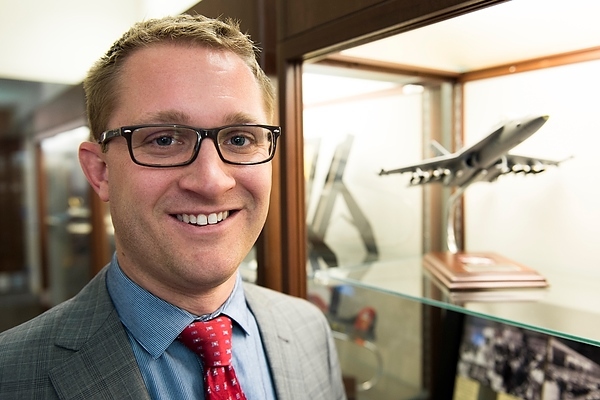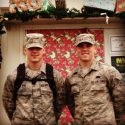Student veterans find another service opportunity in social work

Joe Rasmussen, veteran services and GI Bill benefits coordinator in the Veteran Services and Military Assistant Center, is pictured alongside a model of an F-18 Hornet, for which he developed weapons systems while in the Marines.
When Andy Heitman returned to Madison after eight years as an intelligence officer in the Air Force, one of the first things he did was enroll in the Part-Time Master of Social Work (MSW) Program at the University of Wisconsin–Madison School of Social Work.
“My whole goal all along, post-military, was to help vets any which way possible,” says Heitman, now a case manager for Iraq and Afghanistan veterans at the Veterans Affairs hospital in Madison. “I saw social work as the best avenue to help veterans that were hurting.”
Social work is an increasingly popular choice for veterans returning to graduate school. Just under 20 percent of graduate students receiving veterans benefits at UW–Madison are pursuing a master’s degree in social work, according to data from the UW-Madison Graduate School, while only 4 percent of graduate students overall are enrolled in the MSW Program.
Heitman says the same service-oriented nature of those who volunteer for military service can also spur a desire to pursue social work as a career. People who serve in the military “are servants by heart,” Heitman says. “I’d imagine they felt the same opportunity would be there in social work.”
People who serve in the military ‘are servants by heart,’ Heitman says. ‘I’d imagine they felt the same opportunity would be there in social work.’
Heitman, who enrolled in the Part-Time MSW Program when it began in 2009, says the opportunity enabled him to balance a full-time job and family life while pursuing a master’s degree. The chance for working adults to balance their commitments can be particularly helpful for veterans, who often develop financial and family obligations during their time in the service, Heitman says.
Joe Rasmussen, veteran services and GI Bill benefits coordinator for UW–Madison, also knew he wanted to help veterans, having served in the Marines working on weapons systems of F-18 fighter aircraft.
He graduated from the Full-Time MSW Program in 2012. The hallway to his office in the Veteran Services and Military Assistance Center (VSMAC) is lined with pictures indicative of the tradition of military service on campus.
“I knew about veterans because I was in the military,” Rasmussen says.
As a first-generation college student at UW-Whitewater, Rasmussen received GI Bill benefits. Now, he helps student veterans access benefits such as the GI Bill and VA health care. He says the social work master’s program gave him the confidence and management skills to do that work.
Helping veterans access benefits is among the purposes of the new VSMAC, which the university opened in May. The office provides direct access to student life services for veterans. It also offers a space for veterans to meet liaisons for resources such as career advising and VA services, as well as privacy for students who want to have personal discussions with Rasmussen about an issue.
“… helping (veterans) kind of work their way through the system, giving them the tools they need, and then having them receive their grades at the end of the semester is definitely very rewarding to me.”
Joe Rasmussen
Rasmussen says he has seen more veterans accessing the in-person and online services offered on campus since the center’s opening.
“Taking the very first semester, new military veteran and helping them kind of work their way through the system, giving them the tools they need, and then having them receive their grades at the end of the semester is definitely very rewarding to me,” Rasmussen says.
He hopes to keep improving services for veterans on campus by educating academic advisors and professors on veteran-specific needs, and by creating a policy that helps students who are called to active duty.
Army veteran Sarah Uphoff, who is currently in her second year of the Full-Time MSW Program, says the VSMAC was really supportive in helping her access the GI Bill and other state benefits for veterans.
“If it wasn’t for the GI Bill, I wouldn’t have gone for my master’s,” Uphoff says.
She notes that getting her master’s degree in social work is helping her pursue her goal of working with veterans, possibly at the VA, where she is currently an intern on a case management team with Heitman.
“I really enjoy working with veterans,” she says. “I like the cohesion, the brotherhood, basically the sense of being a part of a team.”
Rasmussen also says military service is structured around teamwork, and that doing social work is “being on the team of a person.”
“I feel like I’m on the veteran team,” Rasmussen says. “This is my family, and I am doing everything in a way that’s going to benefit them the best.”
— Meghan Chua



